FOCUS ON ENERGY EFFICIENCY
In this week’s issue...
Ukraine Latest: Kyiv Receives Patriot Missile Systems from US and Germany
NEWS PAGE 2
More Realism, Less Hypocrisy: Cooperation by Action, Not Posturing by Words. Part 1
POLITICS PAGE 4
Unpacking China’s Global Initiatives
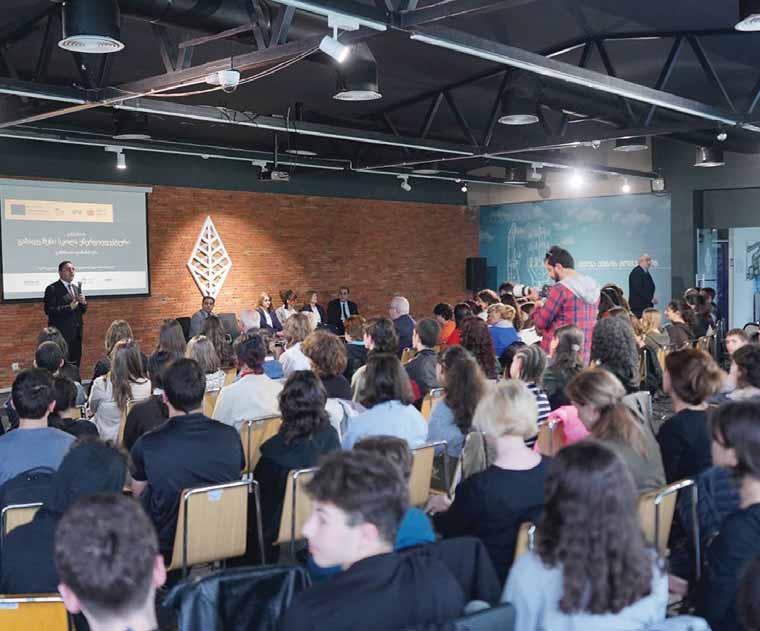
POLITICS PAGE 6
Terabank in Partnership with Visa Implements Visa B2B Connect in Georgia
BUSINESS PAGE 6
Open Letter from Somkhishvili to President Zelensky
BUSINESS PAGE 8
Right vs Wrong - Gen. David Petraeus on Russia’s Staggering Failure and the Strengths of Ukraine’s Upcoming Offensive
INTERVIEW BY VAZHA TAVBERIDZE FOR RFE/RL
Retired General David Petraeus spent nearly forty years in the US Army, commanding US forces in Iraq and Afghanistan before serving as director of the CIA in 2011-12.

In an interview with RFE/RL's Georgian Service, Petraeus argues that Russia's invasion of Ukraine is "about as clear a right-versus-wrong as we've seen in our lifetime." He also talks about the "staggering failure" of Russia's military leadership and its refusal to learn from its mistakes, the aims and strengths of Kyiv's impending combined arms offensive, and why the West will be unable to seek an early exit.
WHERE DO WE STAND IN THE UKRAINE WAR?
We are awaiting the expected Ukrainian late spring / early summer offensive, which will feature Western tanks, Western industry fighting vehicles, artillery in a variety of other systems, and the kind of training and unit development that will allow Ukraine for the first time to achieve combined arms operations in this particular war, something that Russia has not done in the past, and something that the Ukrainians did, to a modest degree, in the Kharkiv offensive last fall.
The Renovated Restaurant of Hotels & Preference Hualing Tbilisi


SOCIETY PAGE 8
Novruz 2023 at Shangri La Tbilisi!
SOCIETY PAGE 10
PreparedforGeorgiaTodayBusinessby
Issue no: 1395 • • APRIL 21 - 27, 2023 • • PUBLISHED WEEKLY
PRICE: GEL 2.50
Continued on page 5
The EU, KfW, GOPA intec and CENN unite with the Georgian gov’t to promote energy efficiency in Tbilisi’s schools PAGE 9
Gen. David Petraeus. Photo by Linda Davidson/The Washington Post
Ukraine Latest: Kyiv Receives Patriot Missile Systems from US and Germany
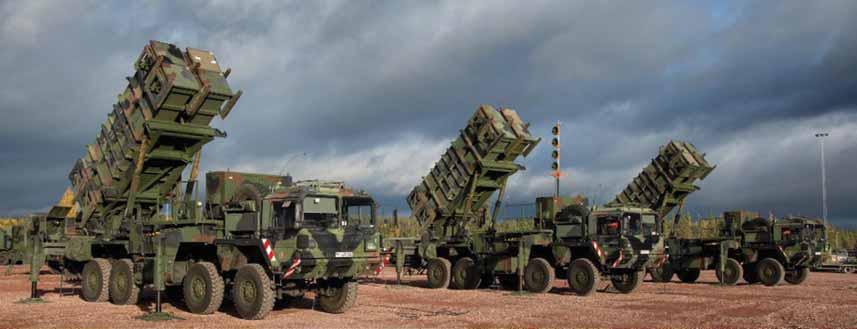 COMPILED BY ANA DUMBADZE
COMPILED BY ANA DUMBADZE
The Patriot air defense systems the Ukrainian government called for to help the country defend itself from air attacks have at last arrived in the country.
Defense Minister Oleksii Reznikov posted on Twitter that “our beautiful sky is made more secure because Patriot air defense systems have arrived in Ukraine”. He thanked the US, German and Dutch governments for providing them, and noted he first lobbied for the Patriots in August 2021, before the invasion, in a visit to the US.
The lack of a considerable Ukrainian air force since the early stages of the invasion has meant Ukraine has been laid bare to Russian air attacks by jet. Ukrainian government ministers were urging foreign powers to provide the missile systems as recently as December, as the US drew up plans to supply them. The Dutch government then agreed in January to also send the batteries.
The second of four promised German Iris-T system were also delivered, according to a German newspaper which had spoken to government officials. No official announcements have been made.
NEW US AID PACKAGE ANNOUNCED
The United States announced a new military aid package for Ukraine on Wednesday to help the Ukrainian military in its war against Russia, Reuters reported. The White House press secretary, Karine Jean-Pierre, told the daily press conference the package will include more ammunition and artillery rounds.
It is the 36th security package since the war began in February 2022.
RUSSIAN FORCES IN BAKHMUT TAKING “HEAVY LOSSES”
The Ukrainian army is reporting that the Russian forces in Bakhmut are taking “heavy losses” after seven strikes throughout Wednesday.
An update by the general staff of the armed forces of Ukraine said that two areas which included soldiers, weapons and military equipment and ammunition depots, were hit.
As Ukrainian authorities reported increased Russian use of heavy artillery and airstrikes around the contested town of Bakhmut on Tuesday, DW spoke to retired US General Ben Hodges.
"Bakhmut is actually all about Crimea," Hodges said. "Ukraine has managed for
1,208,462
Int’l
Travelers Visited Georgia in First Quarter of 2023
The National Tourism Administration published the statistical data on international visitors in the period of January-March.

The Administration says 1,208,462 international travelers visited Georgia in the first quarter of 2023, which means a 74.7% recovery of the pre-pandemic data, and compared to the period of January-March 2022, the increase is +109.6%.
“A special increase is observed in the
part of international tourist visits. In the first quarter of 2023, 845,332 international tourist visits were made to Georgia, which is a 95.8% recovery of the data of 2019, and compared to 2022, the increase is +83.8%.”
The number of international travelers and international tourist visits is calculated according to the methodology developed on the basis of the recommendation of the World Tourism Organization and includes visits already made and completed.
nine months to stop Russian forces from capturing Bakhmut. In the meanwhile, they have been building up forces that they're going to use in their offensive, which I think will happen in several more weeks, that will be aimed at isolating the Crimean Peninsula and then eventually making Crimea untenable for Russian forces."
The former commanding general of US Army Europe said he believed the counteroffensive might be likely to commence around June: "It was never going to be a spring offensive, it needs to be when they're ready to attack, and when the weather conditions are better, the ground specifically," he said.
If Ukraine could break through Russian lines to the Sea of Azov and isolate the peninsula off the southern coast, Hodges said that would be "the begin-
ning of the end for the Russians in Crimea."
It would then be possible to isolate Russian forces there and use long-range weaponry to target sites like the major naval base at Sevastopol, he said.
Russia annexed Crimea in 2014, years before its full-scale invasion. Sevastopol provides its navy with valuable access to the Black Sea and the Mediterranean.
PUTIN VISITS OCCUPIED TERRITORY
Russian President Vladimir Putin visited Russian-controlled territory in Ukraine’s Luhansk and Kherson regions on Monday.
A video broadcast by Russian state television showed Putin arriving in the southern Kherson region in a helicopter and meeting top military commanders. He was then seen visiting the headquar-
ters of the Russian National Guard in the eastern Luhansk region.
While this was Putin's second visit to regions under Russia's control, it was the first time the Russian leader visited Kherson and Luhansk — regions that are partly controlled by Russian troops. It comes as Ukrainian troops prepare for a fresh counteroffensive to reclaim the occupied territories.
Last month, Putin visited the Sea of Azov port city of Mariupol which came under Russia's control in May last year. While meeting troops in Luhansk and Kherson, Putin wished them a happy Easter, which Orthodox Christians celebrated on Sunday.
In September last year, Russia annexed the regions of Kherson, Luhansk, Donetsk and Zaporizhzhia in a move that was internationally condemned as illegal.
PM: This Year We Have 7% Economic Growth
PM Garibashvili
We have a fairly high, 7% economic growth this year, and we also have positive and optimistic data in the direction of tourism, – Prime Minister Irakli Garibashvili said at the meeting
of Government on Tuesday.
He explained that in the first quarter, more than 1,200,000 international travelers visited Georgia.
“Trade is also growing. In the first quarter, in January-March, a 25% increase in exports was recorded and amounted
to $1.461 billion, which equaled the record volume of the first quarter,” the PM noted. Garibashvili also stated that a largescale state program for the development of cities and resorts is starting, which will last five years and have one billion GEL allocated to it from the budget.
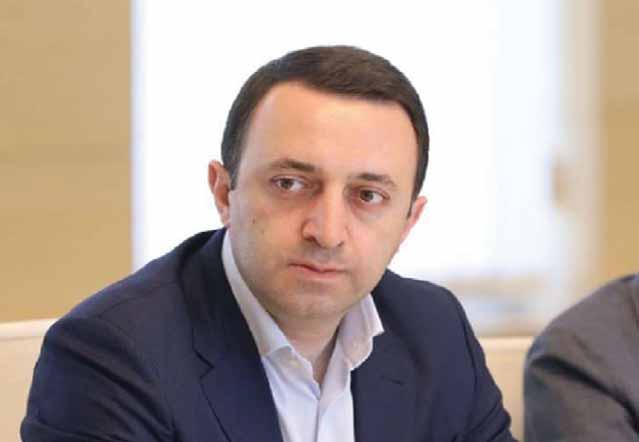
GEORGIA TODAY APRIL 21 - 27, 2023 2 NEWS
NYT: NATO is Changing its Defense Strategy
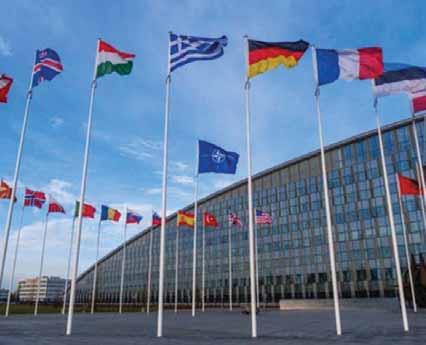
New Rules for 2024: Visa-Free Country Citizens Must Get ETIAS Authorization to Travel to EU
The European Union in Georgia reports that from 2024, nationals of all 59 countries across the world that enjoy visa-free travel to the EU, including Georgia, will be required to obtain ETIAS.
“Note to travelers to the European Union: From 2024, nationals of all 59 countries across the world that enjoy visa-free travel to the EU, including Georgia, will be required to obtain ETIAS
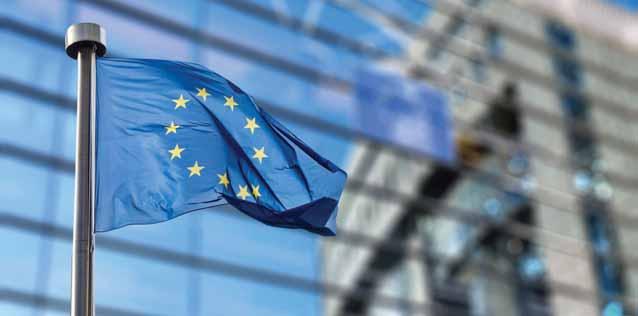
(European Travel Information and Authorization System) travel authorization – a new requirement introduced by the European Union, to enter any of the 27 Schengen countries, Bulgaria, Romania, or Cyprus,” reads statement. The European Union in Georgia explains that ETIAS is not a visa. The visa-free regime for short visits to the EU and the Schengen countries remains enforced
for Georgian citizens.
ABOUT THE ETIAS TRAVEL AUTHORIZATION

ETIAS travel authorization is an entry requirement for visa-exempt nationals travelling to any of the listed 30 European countries. It is linked to a traveler’s passport. It is valid for up to three years or until the passport expires, whichever comes first. If you get a new passport, you need to get a new ETIAS travel authorization.
You can fill out the application form using either this official ETIAS website or the ETIAS mobile application. Applying for the ETIAS travel authorization costs EUR 7, though some travelers are exempt from paying this fee. Read more about what you need to apply and payment exemptions at travel-europe. europa.eu.
Most applications are processed within minutes. It is possible, however, that your application may take longer to process. If so, you will receive a decision within four days. Please note that this period could be extended by up to 14 days if you are requested to provide additional information or documentation, or up to 30 days if you are invited to an interview. This is why you should apply for an ETIAS travel authorisation well in advance of your planned journey. With a valid ETIAS travel authorization, you can enter the territory of the 30 isted European countries as often as you want for short-term stays – normally for up to 90 days in any 180-day period. However, it does not guarantee entry. When you arrive, a border guard will ask to see your passport and other documents and verify that you meet the entry conditions.
Russia’s invasion of Ukraine has prompted the North Atlantic Treaty Organization to “spare no effort to become a military alliance capable of waging war again,” reports
The New York Times.
In particular, the alliance is going to change its defense strategy. In the past, it was considered that in the event of a Russian invasion, the temporary occupation of the territory of the members of the alliance, until receiving the help
of additional forces, was permissible. However, after the crimes committed by Russian troops in Ukraine, Eastern European countries do not want to risk falling under Russian occupation. The new defense strategy is to make NATO forces more “visible” to Russia and show Moscow that the alliance is capable of resisting the first stage of a possible war.
To increase “visibility”, NATO plans to deploy more troops near the Russian border and spend more on defense.
GEORGIA TODAY APRIL 21 - 27, 2023 3 NEWS
In the Aftermath of the Easter Bliss
OP-ED BY NUGZAR B. RUHADZE
The Easter holidays gave us a chance to forget, albeit for a few short days, the troubling developments ongoing around us. Doing without the news for a while was indeed very relaxing - the sacred days of the Holy Week that made most of us contemplate in the most elevated spiritual disposition about things other than our everyday trivial routine, readying us for Christ’s Resurrection Sunday, the most delightful day for a Christian believer, and not only.
Now that those joyful days have passed, we are back to our regular socio-political struggle for survival, with life bringing the same earthiness, directness and bitterness to the prose we are accustomed to: the war still raging in the scorched and devastated Ukrainian land, lives either wasted and unaccounted for, or at perpetual risk of being lost; prices skyrocketing all around the globe; occasional hot spots popping up on earth; hostilities not relenting between superpowers; global problems becoming more incisive; and human pains sharper and
their shrills more penetrating. Against this dreary background that chills us to the marrow, Sakartvelo has its own problems to be taken care of, the political confrontation at its acme, generating the utmost societal polarization and keeping the taxpayer from useful productive work; enduring universal strain, caused by the possibility of the opening of a second front, conducive to losing peace and calm forever; Georgia’s current government firmly setting its sights on peaceful development, not deviating from this no matter how hard it might be not to flinch in the burning spotlight shining on it nonstop; the inconceivable growth of prices, when the value of the dollar plummets by the day, creating the impression that some mysterious scam is being perpetrated; the case of four Georgian judges charged with corruption, losing access to America, and waiting for the time when justice will be meted out in their favor; the international scandal, taking roots in Georgia and organized by a Georgian gentleman of fishy reputation, who diddled the retired elderly out of their savings, a mega-swindler who should have known better, pumping the pilfered wealth into the Georgian oppositional media, his unmatchable ‘exploit’
still further regrettable because the world will know his origins and make conclusions thereof; and, finally, the famous Rikoti Pass debacle, a route which takes people back and forth from east Georgia to the west and vice versa, with its landslides right before Easter, damaging the now-under construction
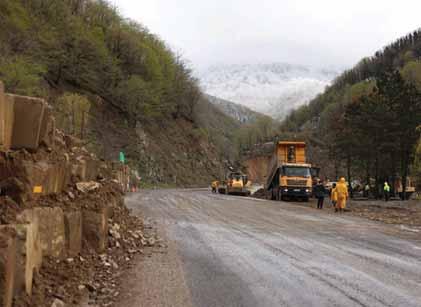
road. They say rainy weather triggered the slide, but who can contend against weather? Mother Nature will always have its way over Man’s will to make life easier at her expense. And now, to add insult to injury, rumor has it at the grassroots level that the whole gigantic project might have more faults to it,
which is hard to believe, but, as always happens in cases like this, the clouds are banking up over the idea of the much-spoken-about and long-awaitedfor project of the century. How big could the trouble we have presumably found ourselves in be? Jokes abound about it. One funny comment was made by an oppositionist that the landslide was manmade to prevent people from coming over to Tbilisi to participate in the oppositional rally on the 9th of April. This one needs no further comment: the current means and ways of political fight are widely known to our public. Hopefully, we will all wise up a little as time passes.
Now, refreshing the ebb and flow of our politics and power play, just a little patience would help if we had any at all. Why should we suffer so much tension and exertion in a sweet and beautiful land like Sakartvelo, where the very air is replete with melodies and an innate sense of happiness? All because there is that uncanny interminable altercation between the opposed political forces – a stupid, vain, fruitless and irrelevant verbose skirmish. Perhaps we should enact a stringent law prohibiting the unfounded and unnecessarily loud wordy clash between them!
More Realism, Less Hypocrisy: Cooperation by Action, Not Posturing by Words. Part 1
ANALYSIS BY VICTOR KIPIANI, GEOCASE CHAIRMAN
Anew date, February 24, 2022, has appeared in the calendar of the history of modern international relations, finally separating the old, ineffective and unusable system of overcoming modern security challenges from the system that is emerging now and is as new as it is unexplored, including in terms of usefulness and effectiveness..
A range of theoretical schools, from statist-normativist to realist, compete to discuss the new system. While the first one considers the already well-known ideological thesis for defining the new system - "democracy vs. authoritarianism," the second one refers to a de-ideologized balance of power as its basis (taking into account the necessary minimum of geopolitical "cohabitation").
Regardless of the content or intensity of the theoretical-ideological "clash," the ongoing war in Ukraine has left no way for the Transatlantic Alliance to retreat in terms of critically rethinking its means of border revisionism in Europe. Moreover, the war was itself a strong reminder to Europe itself that any flirting with the idea of "strategic autonomy" at this stage is more of a pretentious ambition than a realistic vision, and that the United States still plays the role of guarantor (host) for "Old Europe". However, it is no less important that after the collapse of the USSR, for three decades now, the states neighboring now the Russian Federation (including Georgia), hovering in geopolitical uncertainty, have been waiting for a timely clear position from the West for ending this geopolitical "semi-pregnancy". The war in Ukraine finally exhausted the practical content of half-hearted, conventional approaches studded only with glossy declarations, and clearly demonstrated the uselessness of such approaches.
The schemes called in recent decades "rapprochement guides" or "roadmaps to integration" for geopolitically vulnerable geographies have become the narcissism of the modern era. The time has come for such cooperation in deeds, not in words, in which the division into seniors and juniors is replaced by a reconciliation of interests, and a genuine part-
FOREIGN POLICY ILLUSTRATION
nership is based on a correct and timely understanding of common challenges. And someone's pathetic "uniqueness" or "exclusivity" will be replaced by convergence of pragmatic interests, rational thinking and action.
The fact is that in the process of modeling the future of national security, the perceptions existing up to now have moved from the boringly standard to the format of the uselessly standardized. As a result, the world has begun to move toward new, experimental versions of security solutions, the contours of which are only vaguely outlined at this point. It should also be noted that in order to achieve the necessary efficiency and effectiveness, it is not enough to pursue this process only through the prism of "the struggle of democracy against authoritarianism". To achieve tangible results, it is equally a priority to thoroughly dismantle existing multilateral international mechanisms and replace them with new ones, or to radically reorganize them and transform them into institutions with real power - not just moral authority. Equally important is the establishment of a new economic way of thinking about security broadly, aimed at addressing inequalities
or imbalances, and the need to reshape current ceremonial-protocol forms of governance into meaningful modern service providers.
Military conflict is not new to humanity. But systems-forming military conflicts that lead to a new balance of power and a system of relations (whether based on "order" or "disorder") on a global scale are of particular significance. The war that began in Ukraine on February 24 last year belongs exactly to the category of systems-forming conflicts. Accordingly, it has a direct impact on both the regional and our nation-state development. The correct perception and analysis of the results of the war related to such development requires an adequate rethinking of our own expectations, building them on the real possibilities and available resources. In this article we will talk about some necessary circumstances or facts to better reason about the issue.
CHOOSING OR NOT CHOOSING ONE SIDE: THE POSSIBILITY OF THE IMPOSSIBLE?
The created disorder and uncertainty in the global balance of power begs one
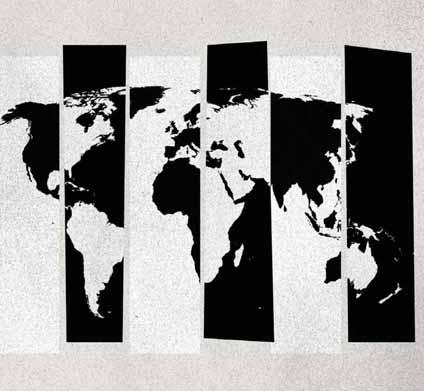
such very pressing question: How appropriate is it to continue to be guided by the so-called binary principle of dividing into two - black and white - in international relations? To what extent should expediency be overshadowed by considerations of, say, "morality" or "ethics"?
Wouldn't any opposition to the expedient approach be a kind of narcissism, self-deception, a futile and fruitless attempt to achieve a particular result for the country? This is an issue on which a full and objective discussion is only possible through an unbiased observation of the big, global picture, through a depoliticized and deideologized analysis of processes and trends.
One visible trend in the context of the current conflict is the refusal of a certain group of countries to choose sides. This kind of "multialliance," adjusting to the balance of power in the newly emerging order, gives medium-sized and small countries the opportunity to maintain relations with the global poles (and in some cases, to actively cooperate). The reason for this is essentially that they do not have to make the kind of choices that are known as standing on the side of one particular confronting side to the detriment of the interests of the other confronting side. In a given order/disorder, such "hedging" in the external vector serves to manage risks and minimize threats in the short and medium term.
It is clear that the desire alone is not enough to follow the line of non-choice by geopolitical hedging: it requires proper integrity, political skills, appropriate qualities and competence of the members of the leadership team.
It is worth noting that the major players are also ambivalent about the new international political formation. For example, the latest version of the U.S. National Security Strategy speaks not only about cooperation with strategic allies and partners. It is indicative that the U.S. foreign doctrine, contrary to the long-standing dogma of "democracyautocracy," has shifted toward a more open, relatively inclusive approach. And there is a rational explanation for this: in the struggle with Russia and especially with China over the distribution of influence in the world, it has become difficult to secure alliances with ideological clichés alone. Thus, the time-driven pragmatism in the foreign arena also determined the rationality of Washington's
approach. This manifests itself in ad hoc alliances or partnerships with historically, culturally and ideologically different (and sometimes sharply different) countries to solve problems. As a result, to strengthen its position in the new world, a global actor today needs to structure relations in a new way and invest in them properly. We would also add that this new foreign doctrine is clearly trying to look at the processes in a post-one-polar world through the lenses of realism. Moreover, for the sake of practical utility, the United States, as a participant in the new global system, uses very specific methods to pursue its interests, such as: A realignment from stated ideological straightforwardness to the creation of a more "nuanced" policy; Not engaging in an endless competition of "gift-giving" with other global players to win the favor of particular nations; Supporting the interests of other nations, securing them and considering them only on a reciprocal basis.
Of course, the so-called "multi-alliance" - the avoidance of taking any side, depending on the specifics of each country - is also a specifically realized choice. A good example of this is Israel, which simultaneously with its strategic alliance with the United States works closely with its main rival, China, in the economic sphere, and also has tactical cooperation with Russia on security issues in the Middle East.
It is also natural that the attitude of a global or any other major player to a medium or small country primarily serves the interests of the former. This tendency has become even more evident in recent times, with the major countries seemingly trying to avoid the intrusive role of "geopolitical babysitter," acting with pragmatic agreement on goals and without automatic expressions of solidarity. Examples of this unity of interest include such situational-tactical platforms as the Quad, the Abrahams Accord, and I2U2. Despite a number of drawbacks, this approach can lead to a more self-sufficient system of relations: its participants realistically assess each other's expectations and clearly and acceptably define specific policy priorities. This approach is also perhaps the most effective response to pointless posturing and the waste of resources in international relations.
Continued in next week’s GT.
GEORGIA TODAY APRIL 21 - 27, 2023 4 POLITICS
The Rikoti Pass. Source: Facebook, Georgian Roads Department
Right vs Wrong - Gen. David Petraeus on Russia’s Staggering Failure and the Strengths of Ukraine’s Upcoming Offensive
Continued from page 1
I'm referring to the use of tanks together with infantry, to keep the enemy infantry and their anti-tank guided missiles off the tanks, with artillery and mortars, suppressing the enemy, and with engineers and explosive ordnance disposal to reduce obstacles and defuse mines. With air defense with the tanks to keep the enemy off them, supported now by the MIGs provided by Poland and other NATO nations, logistics right up behind them with additional ammunition, food, fuel, water, medical support, and supplies, good command and control on the Ukrainian side, plus electronic warfare to degrade the communications of the Russians.
And then, most important of all, perhaps right behind the lead elements, additional units that can exploit the gains of the lead forces, something that didn't really exist in Kharkiv last fall, so that when the physical capacity of the forces was reached, after a week or so, there was nothing to push through, to exploit it in the way I think we will see this summer. So that's where we are we. We completed a year in which Russia lost the battle of Kyiv, lost the battle of Kharkiv, lost the battles of Summy and Kherson, and they failed to achieve their winter objectives. Now, we'll be faced with a spring and summer offensive by new Ukrainian forces that are being trained and equipped in Germany, Poland, the UK and Ukraine. I believe Ukraine will achieve what it sets out to do.
WHAT MIGHT THE END PRODUCT OF THE UKRAINIAN COUNTER-OFFENSIVE BE?
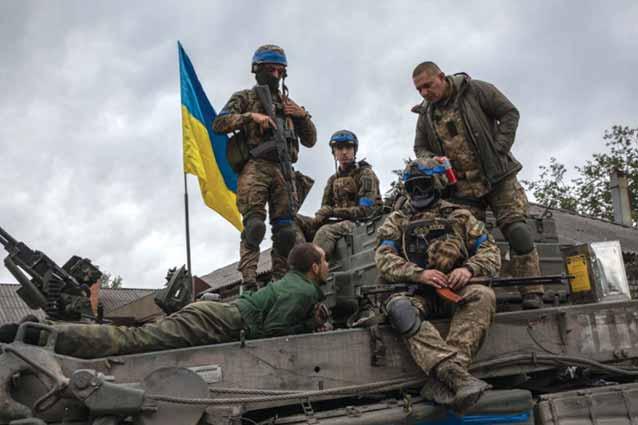
I think it will be twofold. One will be to ensure the Russians are not able to reinforce or resupply Crimea through the southeastern part of Ukraine, so to sever that ground line of communications that they achieved in their offensive last spring and summer. Second will be to bring about the crumbling, perhaps even collapse, of Russian forces in a fairly broad area of southern Ukraine, as they liberate more of the Ukrainian territory that the Russians captured last year, up to Crimea.
INCLUDING CRIMEA? WHERE
DO WE DRAW THE LINE?
WHAT'S THE EXPECTED RESULT?
Well, this will take time, they'll do it a piece at a time. Very important is that they reached the point of having the additional longer range precision munitions, with a range of about 150 kilometers, that the US is providing for the multiple launch rocket system we handed
over. It’s precise; they can hold at risk and target many more of the sites in Crimea that have been important to supporting Russians in southern and southeastern Ukraine- the air bases, headquarters logistical locations, reserve forest locations, and so forth.
GENERAL MARK MILLEY SAID THAT UKRAINIANS HAVE TURNED BAKHMUT INTO A SLAUGHTERHOUSE FOR RUSSIANS. COULD THIS HAVE BEEN THE UKRAINIAN PLAN ALL ALONG, TO USE THE BOTTLENECK TACTIC AND WASTE RUSSIAN MANPOWER?
I don't know whether it was all along but it has clearly become that over time. Early on, I believe even Ukrainians would observe that Bakhmut has no real geographic significance. It's not a great rail or road hub the way some other locations are. But I think they came to see the value of defending an urban area against a force that was very unprofessionally throwing soldiers into this particular cauldron, and allowing those soldiers, as General Milley said, to be “hammered.” The losses have been staggering; the gains have been incremental, and incredibly costly. And I think over time, President Zelensky clearly came to recognize the need to not give Russia anything that it could portray as a victory.
WE CAN TALK AS MUCH AS WE WANT ABOUT THE LEADERSHIP DEFICIENCIES IN THE RUSSIAN MILITARY. BUT SURELY THEY COULD HAVE SEEN THE TRAP?
The problem is that they don't have any alternatives. They don't have well trained forces, they no longer have well equipped forces, they don't have collective training of these units, the way the Ukrainian forces have. I think it's very important for observers to recognize that the Ukrainian forces that will lead the offensive this spring and summer are not engaged in Ukraine on the frontlines right now. They are in training in Germany, Poland, UK, Ukraine and elsewhere. And over time, the conditions will be set for a combined arms operation before they launch that offensive. The Russians haven't done that. They’ve basically just thrown soldiers into units. There's no cohesion, and there's no real organization to it. Some are our actual former convicts, prisoners who were given a chance to get out of jail, free, if you will, and if they could survive for six months, they could go for eight months. But of course the odds of surviving the way the Russians have employed them are not great.
What the Ukrainians will do in the upcoming offensive is going to be vastly different; combined arms operations, which again, the Russians didn’t achieve even at the outset, despite having had months deployed in Belarus and in Russia, on Ukraine's borders, when they could have been training on these kinds of tasks. That's a staggering failure.
YOU ONCE LED AN INVASION. NAME THREE MAJOR MISTAKES RUSSIA MADE IN THIS WAR.
At the very highest level, they completely underestimated Ukrainian capabilities, and they completely overestimated their own capabilities. They failed to design a campaign properly, and to prepare the forces to carry out that campaign. Beyond that, they didn't have modern communication systems. That's why the generals kept getting killed.
We've always known that they lack a professional Non-commissioned Officer Corps, which are the backbone of our forces in the West, but they demonstrated
many, many, many deficiencies some of which were anticipated, others of which were somewhat surprising, such as the fact that their communication system is single channel so you can easily find it. It's not encrypted. It's also HF, which means it's broadcast very widely, anyone can pick it up with a police scanner, as opposed to ours, which is FM frequency and encrypted. Again, that they don't have that kind of system at least encrypted is really quite staggering, given how much they supposedly invested in the modernization of their military.
THERE IS AN ENDURING BELIEF THAT RUSSIANS ALWAYS START BADLY, AND THEN THEY GET BETTER. BACK IN OCTOBER, YOU SAID THAT THE BATTLEFIELD REALITY PUTIN FACED WAS IRREVERSIBLE. SIX MONTHS ON - IS THERE STILL A CHANCE FOR RUSSIA TO TURN IT ALL AROUND, LEARN AND ADAPT?
It should have been, but their military is not a learning organization, as we sought to make our forces into. When I was privileged to command our forces in Iraq and Afghanistan and the greater Middle East, we explicitly set out to be learning organization - we built that concept into what it is that we did, lessons learned, planning sessions that required me to make decisions, refine the big ideas, the strategy, the tactics, and so forth. You have to build a culture of learning. In most NATO countries, they do that. Russia clearly has not done so. They're not a learning organization. They didn't recognize the deficiencies in advance. And some of these are not the kind of deficiencies that you can remedy just by sitting down and trying to learn lessons, though, because developing a professional non-commissioned officer corps is a huge decision, involving years of training and education and development and experience.
I just don't see them learning, but I do see the Ukrainians learning and developing and getting better and better. And that's why I say they will do what the Russians have failed to do, which is to achieve combined arms effects and operations.
What I should point out, though, is that Vladimir Putin is still not convinced that the Russians will not be able to outsuffer the West; he still thinks that, just as you said, in history, the Russians always
have a terrible start. The Nazis pushed them back, Napoleon's army pushed them out, but in the end, they prevail. And he still thinks he can out-suffer the Ukrainians, the Europeans and the Americans in the way that Russians outsuffered Napoleon's army and the Nazis. And we have to ensure that we enable the Ukrainians to prove him wrong.
IN REALPOLITIK TERMS, CAN WE TRULY ARGUE RUSSIA IS LOSING THIS ONE, CONSIDERING IT OCCUPIES TWICE THE AMOUNT OF UKRAINIAN TERRITORY THAN IT HAD BEFORE THE FULL-FLEDGED INVASION, SOME OF THE RICHEST, FERTILE LAND IN EUROPE?
The war is still not over. This is still very much a work in progress. Ukraine has achieved some extraordinary victories, but the Russians, still control almost 20% of their territory, so, this is still ongoing, they should certainly be proud of what they have achieved, we should be proud of what they have achieved and what we've enabled them to achieve. But this is very much an ongoing war. And it requires continued support, continued determination, not just on the part of the Ukrainians, but on the part of those who are helping them in what I think is as clear a right versus wrong, as we've seen in our lifetime; a dictatorial kleptocratic regime, denying the right of its neighbor to even exist, invading it and doing so without provocation in a particularly brutal manner. Their culture is one of committing war crimes rather than preventing them and dealing with them.
HOW DO YOU ENVISAGE THE END OF IT ALL? AT THE MUNICH SECURITY CONFERENCE IN FEBRUARY I REMEMBER YOU SAYING THAT YOU HOPED THAT IT WOULD END BY THE TIME YOUR FORTHCOMING BOOK ABOUT UKRAINE HIT THE SHELVES. THE BOOK COMES OUT THIS OCTOBERIS IT REALISTIC TO EXPECT A UKRAINE WIN BY THAT TIME?
Well, a lot depends on what is achieved by this upcoming Ukrainian offensive. If Russian forces can be forced to crumble and for that collapse to spread, then perhaps you might reach a point at which a negotiated resolution might actually
be attainable. But without that, this is going to go on for another year or years. We need to be prepared for that. We should not be seeking an early exit. The Ukrainians are in this for their survival, their independence. They're determined to do what's necessary and we need to be determined to do the same.
WHAT'S AT STAKE HERE FOR COUNTRIES LIKE MOLDOVA AND GEORGIA?
I think Moldova has significant vulnerability. I believe the US and NATO countries have recognized this and are seeking to provide various forms of support to withstand Russian efforts to undermine the government, to topple it, to not just hang on to Transnistria, but to expand that and to make Moldova a kind of Belarus for Russia, if they can.
Georgia is a bit of a different situation, given that Russia is so intently focused with just about everything they have on Ukraine, and on Eastern Europe, including Moldova. I don't think there's much left for anything outside of that focus. I think Georgia has some breathing space, but they need to make the most of it. And I thought it was very interesting to see in their domestic political dynamics, of course, a very considerable rejection of Russia in recent months.
UNLIKE MOLDOVA, GEORGIA HARBORS NATO MEMBERSHIP HOPES. WHAT IMPACT IS THIS WAR GOING TO HAVE ON THOSE? WAS EVENTUAL NATO MEMBERSHIP MORE REALISTIC FOR GEORGIA BEFORE THIS WAR OR NOW THAT IT HAS HAPPENED?
I suspect it's just a tiny bit more realistic now. I think at some point, you will see not just Finland, but also Sweden, and Ukraine, over time, as NATO members. If there is some kind of requirement in the interim, there will be a security guarantee provided for it. I think we should disregard what the Kremlin thinks about this. We deferred to them in the past, and that set the conditions that enabled Putin to invade Ukraine. Those concerns should be dismissed. We now need to ensure that Ukraine can be part of what is a defensive alliance at the end of the day. And once that's done, I think that the aspirations of a country like Georgia may be more realistic than they were in the past.
GEORGIA TODAY APRIL 21 - 27, 2023 5 POLITICS
A Russian soldier, taken prisoner by the Ukrainians, lies on the tank of Russian soldiers in Izioum, Ukraine, September 2022.
Photo by Laurent Van Der Stokt for Le Monde
We should not be seeking an early exit. The Ukrainians are in this for their survival, their independence. We have to enable them to prove Putin wrong
Unpacking China’s Global Initiatives
ANALYSIS BY EMIL AVDALIANI
In the era of intense great power competition, ideas matter, as they shore up great powers’ claims for global economic and political primacy. The US has long been the one which dominated these two areas. Now it is China which increasingly tries to position itself as a responsible world player. Surely, its success is far from guaranteed, as much depends on a variety of geopolitical variables. Yet the trend is obvious: Beijing is advancing its own multilateral institutions and various security initiatives which would allow it to cement its global clout.
China is gradually moving towards unveiling its ideas regarding the world order it foresees. We do not know much, but recently some elements, albeit incomplete, of its vision have emerged. The Global Security Initiative unveiled by Chinese President Xi Jinping in April 2020, during his keynote speech at the Boao Forum for Asia Annual Conference, offered a glimpse into the Chinese thinking, but most of all signaled China’s global ambitions beyond the merely economic sphere. Rather, it aims at something bigger, at constructing a framework within which China could manoeuvre, but most of all displace the Western security architecture. Critical elements in the GSI include the concept of indivisible security, respect for territorial integrity of all states, and the embrace of the UN Charter. Other points, however, are vague.
The Global Security Initiative (GSI) was presented during Xi’s speech on the Global Development Initiative (GDI) at the Seventy-Sixth United Nations General Assembly. So far, the two ideas evoke many questions, but they do show how conscious China has recently become regarding the need to present alternative concepts of state-to-state relations. The thinking in Beijing is that superseding the US global order requires not only pinpointing the failures of the liberal system, but more importantly, present-
BUSINESS
ing viable alternatives.
The GSI and GDI seek to construct a new order which will be more conducive to Chinese interests. As said, not much is known about the two initiatives, and it is likely that we will see China elucidating concrete details in the coming years. Beijing will look closely at how the concepts are received worldwide and will act accordingly. As has happened with other Chinese initiatives from the past, we might see fundamental changes too in the GSI and GDI as the competition with the US is expanding. This happened with the Chinese flagship project – the Belt and Road Iniatiave (BRI). Instead of looking at it as a static concept, the BRI has shown its adaptability to rising to challenges and new opportunities. This means that
the GSI and GDI should not be dismissed either. These initiatives are a clear indication that Beijing began to think beyond shaping the global economy and now is venturing more actively into shaping global affairs. The GSI and GDI could be a logical continuation of the BRI. If the latter was about reshaping the Eurasian infrastructure, it did not address security challenges posed by terrorism, extremism and, most of all, competition and open rivalry from other powers. To this should be added a number of events that shook global security and perhaps accelerated the unveiling of the initiatives. From Covid-19 and the chaotic US withdrawal from Afghanistan, to the US’ recalibration of its position in the Middle East and Russia’s war in Ukraine, the
competition between the two emerging blocs, however loose, requires adaptation from Beijing. The GSI and GDI could thus be seen as ideas addressing these challenges. Geopolitical context is crucial here. The war in Ukraine exacerbated the great power competition in Eurasia. Importantly for China, the war helped the West regain momentum and increase its effectiveness and show resolve by supporting Ukraine. A stronger West, and especially a NATO which is ever-interested in expanding its gaze to the Indo-Pacific region, is a headache for Beijing, which has required a Chinese conceptual response. The success of GSI and GDI is not predetermined, however. It is likely, though, that these ideas will be more welcome in countries which generally
seek closer ties with China and have troubled record of bilateral relations with the US.
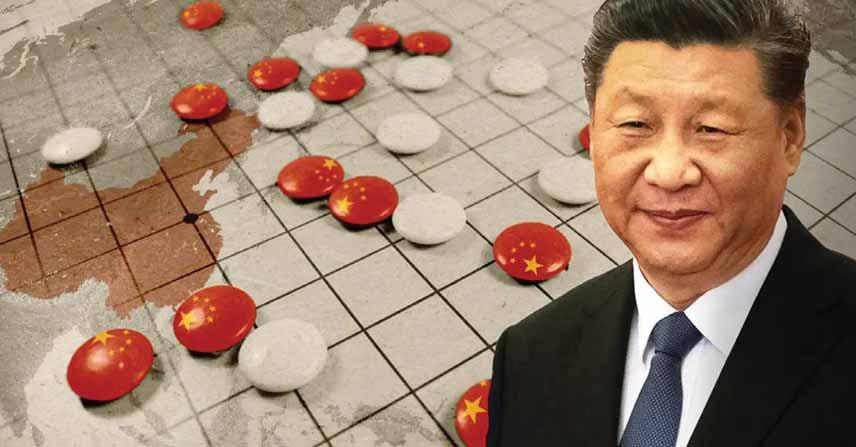
The novelty in the GSI is the “indivisible security” concept. Originally a European idea developed during the Cold War, GSI takes a holistic approach to security. No single country’s security should be achieved at the expense of its neighbor. As the Chinese global initiatives grow in number, the intensity of Beijing-Washington competition will be ever more acute and cover nearly all areas of bilateral ties pushing many countries to make radical foreign policy choices.
Emil Avdaliani is a professor of international relations at European University in Tbilisi, Georgia, and a scholar of silk roads.
Terabank in Partnership with Visa Implements
Visa B2B Connect in Georgia
Terabank has announced the implementation of Visa B2B connect with Visa, the world leader in digital payments. The bank will soon offer business clients the fastest, most effective and most secure cross-border payments system. It is a significant moment for Terabank as it will be a pioneer to use Visa's cutting-edge platform, Visa B2B Connect, solidifying the bank’s commitment to innovation and providing top-tier services to SMEs and large corporate clients.

“As a Bank, we aim to provide our clients with fast, transparent, and secure services,” says Thea Lortkipanidze, Chief Executive Officer of Terabank. “Terabank’s enrollment in Visa B2B Connect will help strengthen business in Georgia and further build the financial services ecosystem for our corporate clients. Terabank’s participation in Visa B2B Connect contributes to the bank’s digital innovation agenda and enhances the partnership of businesses in Georgia with foreign counterparties.”
Visa B2B Connect is an innovative, non-card-based multilateral platform delivering B2B cross-border payments to 107 countries worldwide, that are predictable, secure, and cost-effective for financial institutions and their cor-
porate clients. Unlike traditional methods, Visa B2B Connect facilitates account-to-account transactions from customer accounts directly to beneficiary banks in a seamless manner within 24 to 48 hours, depending on the receiving country. This will create a competitive bene fi t for all commercial clients of the bank, and it will be possible to receive the service both remotely, through the Terabank mobile application, and over-the-counter at
Terabank branches.
“Our team is excited to launch Visa B2B Connect in Georgia in partnership with Terabank to facilitate cross-border payment from Georgia to multiple markets across the globe,” notes Diana Kiguradze, Visa Regional Manager for the Caucasus Region. “We believe that by implementing one more innovative technology in Georgia, we increase the efficiency of local financial institutions and their corporate clients, and sup-
port businesses and SMBs to enjoy Visa B2B connect platform and its benefits. At Visa, we are confident that by driving value for banks as trusted partners, we develop digital payments and e-commerce on a local and global level
“The Visa B2B Connect platform is designed to make cross-border payments easier, fast, secure, and efficient,” Head of Visa B2B Connect, CEMEA, Vishal Virmani says. “Terabank’s participation in Visa B2B Connect will benefit the bank’s customers and expand cross-border commerce opportunities for the Georgian market.”
ABOUT VISA B2B CONNECT
Visa B2B Connect is an innovative noncard-based multilateral platform delivering B2B cross-border payments that are predictable, secure and cost-effective for financial institutions and their corporate clients. Using a one-to-many connection, Visa B2B Connect helps reduce a number of correspondent transfers required to process a payment. This allows for more cost-effective cross-border transactions and provides both corporate finance institutions and their customers transparent view of fees associated with each transaction helping the companies to manage their cash flows. Visa B2B Connect platform can also be used to send
payments to out-of-network banks.
To learn more about Visa B2B Connect and how to join the platform, please visit www.visa.com/visab2bconnect
ABOUT VISA
Visa (NYSE: V) is a world leader in digital payments, facilitating payments transactions between consumers, merchants, financial institutions and government entities across more than 200 countries and territories. Our mission is to connect the world through the most innovative, convenient, reliable and secure payments network, enabling individuals, businesses and economies to thrive. We believe that economies that include everyone everywhere, uplift everyone everywhere and see access as foundational to the future of money movement. Learn more at visa. com.ge
ABOUT TERABANK
Since 1999, Terabank has held a significant place in the Georgian financial sector. Its mission is to Improve the lives of entrepreneurs, their employees, and their clients by fulfilling their business and personal financial needs. This is achieved by providing solutions, exceptional service and personal attention to every single interested person.
GEORGIA TODAY APRIL 21 - 27, 2023 6 POLITICS
China increasingly tries to position itself as a responsible world player. Image source: Nikkei montage/Getty Images
In 2022, the number of domestic visits amounted to 16.3 million visits, which is 3.6% lower compared to 2021, and 14.6% higher compared to the pre-pandemic number, indicating a continuing increased
demand for tourist activities from domestic visitors, albeit at a decelerating rate.
By visited regions, the number of visitors to Mtskheta-Mtianeti and Shida Kartli declined significantly, while visits to Tbilisi and Kakheti increased notably
in 2022 compared to 2021. In 2022, the average nights spent per visit fully returned to the pre-pandemic number,
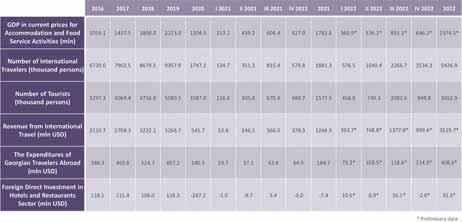
declined significantly by 253,700 visitors, while in Shida Kartli this number dropped by 227,100. Meanwhile, visits to Tbilisi
(12%), and shopping (12%). Among the main categories of visits, “professional” amounted to only 3% of total visits. The expenditure of domestic visitors reached GEL 3 billion, which is higher compared to the previous year (by 9.8%) and 2019 (by 61.7%). The expenditure distribution in 2022 was similar to recent years with most expenditures going on shopping (32%), food and drink (23%), and transport (21%). In absolute values, in 2022, compared to 2021, the expenditure of domestic visitors on transport (by GEL 75.5 million), accommodation (by GEL 43.7 million), and food and drink (by GEL 38 million) increased significantly.
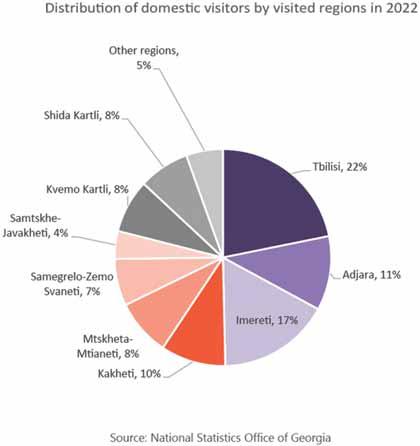
HOTEL PRICE INDEX IN GEORGIA
In March 2023, in Georgia the hotel price index increased by 5.0% compared to February 2023. The 3-star, 4-star, and 5-star hotel price index increased by 7.9%, while for guesthouses, the price index by 5.4%. The monthly HPI was the highest in Mtskheta-Mtianeti (25.2%) and lowest in Samegrelo-Zemo Svaneti (-14.9%)
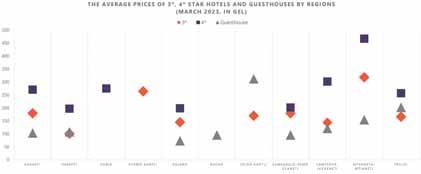
In March 2023, compared to March 2022, hotel prices in Georgia increased by 14.9%. The prices of 3*, 4*, 5* hotels increased by 16.4% and the prices of guesthouses increased by 20.3%. The yearly HPI was the highest in Shida Kartli (29.1%) and lowest in Imereti (0.9%) and Samegrelo-Zemo Svaneti (0.9%).
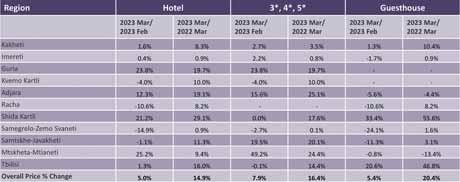
THE AVERAGE HOTEL PRICES IN GEORGIA
showing the reversal of the behavior of domestic visitors after the growth in the length of stay in 2020 and 2021.
The expenditure of domestic visitors reached GEL 3 billion, which is higher both compared to the previous year (by 9.8%) and 2019 (by 61.7%). In absolute values, in 2022, compared to 2021, the expenditures of domestic visitors on transport (by GEL 75.5 mln), accommodation (by GEL 43.7 mln), and food and drinks (by GEL 38 bln) increased significantly.
DOMESTIC TOURISM DYNAMICS
In 2022, the number of domestic visits declined by 3.6% compared to the previous year and amounted to 16.3 million visits. However, although there was a YoY decline, the number of domestic visits still exceeded the pre-pandemic number by 14.6%, indicating continuing increased demand for tourist activities from domestic visitors, albeit at a decelerating rate.
In 2022, the average nights spent per visit was equal to 1.9, which is 10.6% lower compared to the previous year and 5% lower compared to 2019 (i.e. pre-pandemic).
Notably, since the pandemic broke out, the average number of nights spent per visit showed an increase in 2020 and 2021.
The distribution of domestic visitors by visited region in 2022 was similar to previous periods. In particular, the main destination for domestic visits was Tbilisi (22% of total visits), followed by Imereti (17%) and Adjara (11%). In absolute terms, the number of visitors to Mtskheta-Mtianeti
(140,600) and Kakheti (104,300) increased notably in 2022 compared to 2021.
DOMESTIC TOURISM INDICATORS

In 2022, the distribution of domestic visits by the main purpose of the visit was similar to recent years. The main purpose for the majority of visits (51%) was visiting friends/relatives, followed by visiting their second/holiday home
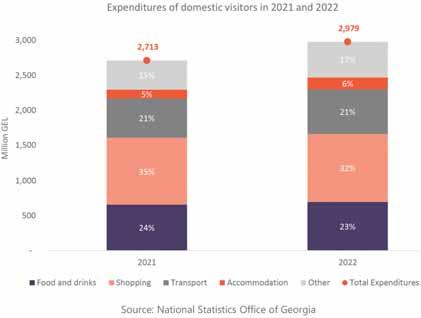
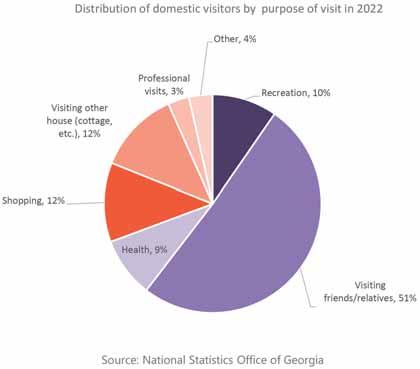
In Georgia, the average cost of a room in a 3-star hotel was 167 GEL per night in March 2023, while the average cost of a room in a 4-star hotel in Georgia was 275 GEL per night and the average cost of a room in a guesthouse was 122 GEL per night.
The average cost of a room in a 5-star hotel in Georgia in March 2023 was 456 GEL per night. In Tbilisi, the average price was 559 GEL, followed by Kakheti – 552, Samtskhe-Javakheti – 458, and Adjara –429.
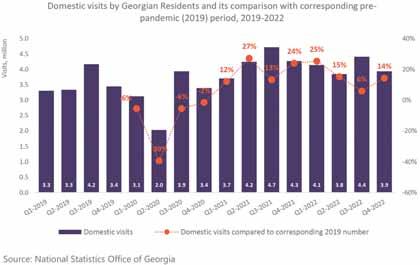
GEORGIA TODAY APRIL 21 - 27, 2023 7 BUSINESS
Table 2: BASIC ECONOMIC INDICATORS IN GEORGIA
Table 1: HPI
Open Letter from Somkhishvili to President Zelensky
At the same time, the position of the prosecutor's office, as stated in court, cannot be viewed as anything other than a direct threat to Ukraine's investment attractiveness. In its application to enter the court case, the prosecutor's office stated that "participation in an investment project is an investor's risk". In global investment practice, the activities of state and local authorities are a factor of stability. Why should an investment project with a state party as a partner be a source of risk in Ukraine?
In 2021, when the case was being considered by the Supreme Court of Ukraine, due to the unprecedented disregard for the investor's legal rights in the Court of Appeal, I was forced to seek the support of the British Embassy in Ukraine, and representatives of the Embassy attended all court hearings. The Supreme Court of Ukraine cancelled the unlawful decision of the Court of Appeal and returned the case for reconsideration to the appellate instance.
have no claims against me either. But this does not stop the perpetrators of the accusations, nor their beneficiaries.
After all, the rejection of the settlement agreement proposed by me and the slanderous campaign are beneficial to those who want to avoid responsibility not only for breaching their obligations to the investor, but also for what had happened to the funds that the city received both directly from the investor and from the budget funds allocated to fulfill the city's part of the obligations in the investment project. It is to their advantage to shift attention from themselves to the investor, and they do not care that such actions actually harm the national security of Ukraine.
Dear President Zelensky, In this difficult time for Ukraine, I must openly address you with a question about a situation that should not have occurred in the country either during war or peaceful times.
When I approached you in September 2021 about the situation in which I, as a citizen of Great Britain and investor, found myself in Ukraine, you responded that it was a consequence of the unreformed courts of Ukraine and that the court system would change for the better in the future. It is clear that the war has hindered the reform of the Ukrainian courts, but as my experience has shown, it is not only the courts, but also the way the local authorities of the city of Kyiv treat foreign investors.
In 2007, together with a global institutional investor, the type of investor you are now trying to attract to Ukraine for the country's future reconstruction, I
SOCIETY
entered into an investment project with the city authorities for reconstruction of Kharkiv Square in the city of Kyiv. Today, such projects are called publicprivate partnerships. However, the attitude that I have encountered and continue to encounter from the city of Kyiv authorities can be called many things, but it is not a partnership.
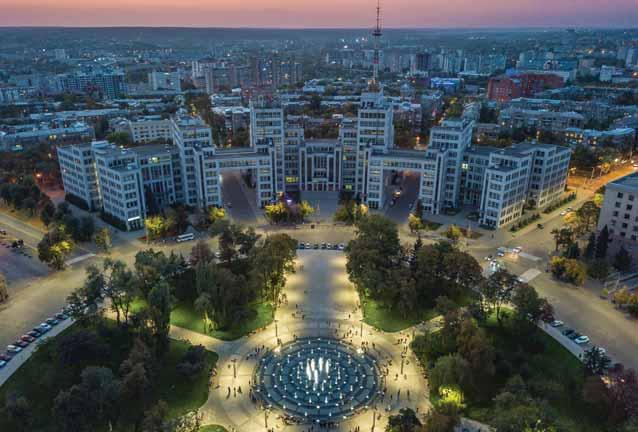
While the investment project was in operation, I had the opportunity to see all the circles of bureaucratic hell that a private investor can face: actions that included both sabotage of the project and outright violation of obligations to the investor. This is despite the fact that during the project's existence, the city received more than $14 million from me, and to fulfill my obligations as an investor, I financed the engagement of the best European architects and infrastructure professionals. In the course of my investment project, I did not receive or request any state or municipal funds.
In 2013, the city authorities terminated the project, recognized that I had incurred costs and losses, and undertook to compensate those. The condition for compensation was that those costs and losses be assessed by an independent appraiser, and I fulfilled this condition. However, even after the project was terminated, the city authorities continued to violate their obligations and refused to compensate the damages.
In 2019, the Kyiv Commercial Court partially satisfied the claim of my Ukrainian company, Kyiv Terminal LLC, which was a party to the investment project with the Kyiv city authorities and ordered the city authorities to pay losses in the amount of USD 24.4 million. In turn, the Court of Appeal, despite the city authorities missing the deadline for filing an appeal, accepted it and, under pressure from the Prosecutor's Office, which joined the case, completely overturned the decision of the first instance court.
In 2022, at a time when the war in Ukraine was still ongoing, the appellate court resumed the case, and I immediately offered the city a settlement agreement, under which I refused the funds awarded to me in the court of first instance and offered to have provided to me a land plot after martial law is lifted to build an infrastructure project in Kyiv. My offer was guided by a full understanding of the difficult situation which the country and the city were facing as a result of the war.
However, the city authorities not only rejected this proposal, but also launched a massive campaign of slander and false accusations against me on an unprecedented scale. These accusations did not only show the attitude towards me as an investor who had fulfilled all his obligations and had not violated any of them, but also the attitude towards my country, the UK, which is perhaps the biggest supporter of Ukraine at this time.
Ukraine's state and intelligence bodies, such as the National Security and Defense Council of Ukraine, the Security Service of Ukraine, and the Foreign Intelligence Service of Ukraine, have confirmed that there are no grounds for false and defamatory accusations against me. The authorities of the United Kingdom, my country,
The Renovated Restaurant of Hotels & Preference Hualing Tbilisi
 BY MARIAM MTIVLISHVILI
BY MARIAM MTIVLISHVILI
Hotels & Preference Hualing
Tbilisi has great news! Professional chefs have been invited from China to prepare delicious dishes reopened Chinese Restaurant - ENSEMBLE. The restaurant offers not only a well-known variety of noodles, fried rice, dumplings, etc., but also dishes like shark fins, abalone, sea cucumber, and jellyfish. In the restaurant you can also find exclusive Chinese alcohol drinks such as Mao Tai, Shui Jin Fang, and Guyue Longshan. To find out more, GEORGIA TODAY talked to Rocky Wang Yan manager of Chinese restaurant of Hotels & Preference Hualing Tbilisi.
Rocky Wang Yan started his journey in hospitality in China back in 1996, working for such 5-star brands as Hilton
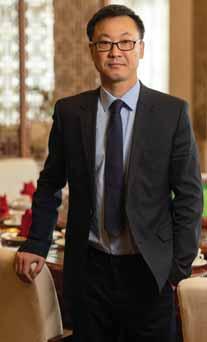
Hotel Beijing, Crown Plaza Hotel Shenzhen, and Grand Bay View Hotel Zhuhai.
In 2012, he moved to Sweden and worked for eight years for the number one Chinese restaurant in Karlstad City - Restaurant Nya. At the same time, he decided to upgrade his F&B knowledge and became a student in Svenska För invandrae skolan Karlstad.
“Before coming to Georgia, I went back to Beijing and worked for Expo Hot Spring Hotel Beijing, a 5-star hotel with 382 rooms and the largest hot springs in Beijing, covering an area of 10,000 square meters,” Rocky tells us. “Georgia is a new market for me and I am very happy and curious to share my knowledge and experience of the diversity and delights of Chinese cuisine.”
BEFORE THE RESTAURANT WAS CLOSED FOR RENOVATION, IT WAS ONE OF THE MOST POPULAR RESTAURANTS IN TBILISI. WHAT CHANGES HAVE YOU MADE TO IT?
Yes, the Ensemble restaurant was the most popular Chinese restaurant in Tbilisi. As such, our main goal was to keep this reputation and at the same time to add new flavors to the menu. We relaunched the restaurant with 56 dishes and will expand that to 96 items from

different regions. And, of course, we will be regularly updating the menu and offering our guests new flavors as well. Our goal is to allow Georgian people to taste authentic Chinese cuisine and discover Chinese traditions.
TELL US ABOUT THE CHEFS AND THE MENU.
To achieve a real authentic taste, we brought chefs from the Guangdong region of China. Our chefs have years of experience in different regions with a main accent on Cantonese cuisine. Cantonese cuisine is one of the eight major cuisines originating from Guangdong Province and it is the most widely served style of Chinese cuisine in the world, combining the essence of Guangzhou, Chaozhou, Dongjiang Hakka cuisine and many others. Cantonese cuisine pays attention to the original flavor, lightly cooked fresh vegetables and meat, and sweet sauces.
On our menu, you can also find dishes from the largest autonomous region in China – Xinjiang. Xinjiang cuisine differs from the rest of the country in its fragrant spices and rich flavors. Because of its location Xinjiang cuisine was inspired by Tibetans, Mongolians, Persians, Turkish and other nationalities. We offer not only well known variety of noodles, fried rice, dumplings, etc., but such dishes as shark fins, abalone, sea cucumber, and jelly fish. At our restaurant you can also find exclusive Chinese alcoholic drinks such as Mao Tai, Shui Jin Fang, and Guyue Longshan.
WHO ARE YOUR TARGET GUESTS?
Our restaurant was operating for many years in Tbilisi and had among its loyal guests locals, Chinese and other foreigners. Of course, our aim is to introduce the unique taste of Chinese cuisine to local guests. We have a variety of well-known dishes, such as home-made noodles, dumplings, our famous Butterfly Garlic Shrimps on Sizzling Plate, spring rolls, Tempura Calamari Rings, as well as such an exceptional dishes as Sichuan Style Beef Muscle, Boiled Fresh Bamboo Sticks, Roasted Duck, Stewed Tofu, Minced Meat with Spicy Sauce and many more.
I know that in Ukraine there is now a saying that for real reconstruction of Ukraine it is important not to "lose peace". I know that you, Mr. President, are making extraordinary efforts to attract institutional and private investors to Ukraine, who will, among other things, participate in future joint projects with the state party, in projects like the one I participated in. But what incentive will these investors have to invest when they see the attitude I have encountered?
I am in no way asking you to influence the court in any way, I hope that in Ukraine it is possible to get fair and impartial justice. However, I also believe the issue of future investment and reconstruction of the country is a matter of national security.
Securing justice that is not influenced by the slander campaign and investigating the beneficiaries of this campaign, as well as what they did with the investment funds received from me and the public funds allocated for the reconstruction of Kharkiv Square in the city of Kyiv, will not only ensure that foreign investors are treated properly, but will also protect the state interest.
If Ukraine does not protect the legal rights of those investors who have already invested in the country, it will hinder your efforts, Mr. President, to attract new investors to Ukraine.
Sincerely yours, With faith in Ukraine's success, Tamaz Somkhishvili
14 April 2023, London, United Kingdom
Our restaurant is a perfect match for those who want to taste real Chinese food flavors and for those who prefer traditional and well known dishes. Just as the ingredients of each dish and presentation is important, table manners and courtesy among diners are very much part of the Chinese cultural tradition. Only by combining excellent food with good manners can the high art of Chinese cuisine be truly enjoyed to the full. And Ensemble restaurant is exactly the place where you can dive into Chinese culture and mouthwatering food.
GEORGIA TODAY APRIL 21 - 27, 2023 8 BUSINESS
Kharkiv (Freedom) Square, Kyiv, Ukraine. Photo by Konstantin Brizhnichenko
Tbilisi Schools Unite around Energy Efficiency as Part of International Campaign
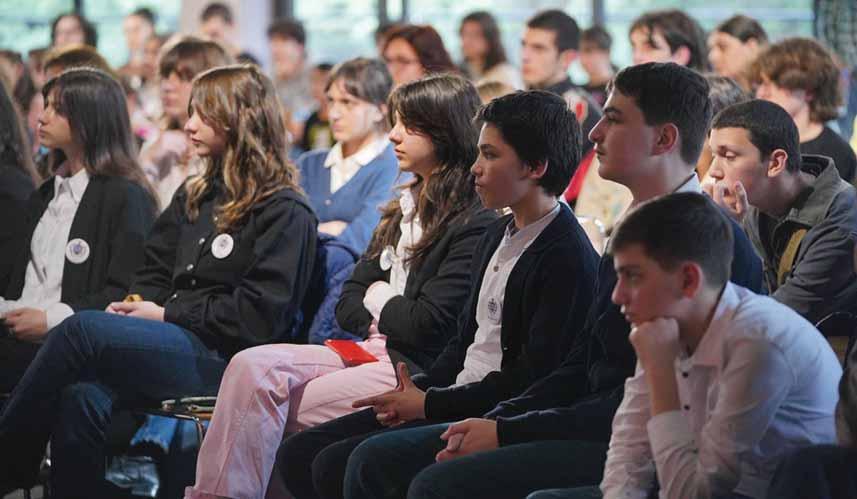 BY KATIE RUTH DAVIES
BY KATIE RUTH DAVIES
Improving energy efficiency in buildings in Georgia is a significant objective not only for those of us among the citizenship and business community of the country, but for the energy community as a whole. The first step to achieving a bigger impact is to improve overall understanding, awareness and knowledge of the importance of energy efficiency as a complement to other national actions to reduce fossil fuel use in the future and improve energy security.
The Georgian Ministry of Economy and Sustainable Development, with the support of the European Union and KfW development bank, and in partnership with the German independent energy consulting company GOPA intec, hosted the kick-off event of the campaign “Make Your School More Energy Efficient” as part of the Georgian Energy Sector Reform Project (GESRP) project, last week.
Started in 2021, the Georgian Energy Sector Reform Project (GESRP) is supporting the Government of Georgia to strengthen its capacities within the Energy Sector, and, in particular, within the areas of Energy Efficiency, Energy Efficiency in Buildings, Renewable Energy and the Power Market in line with Georgia’s obligations, as a Contracting Party to the Energy Community.
“Energy reforms are underway in Georgia, for the successful implementation of which the awareness and involvement of the public are of the utmost importance,” notes Romeo Mikautadze, First Deputy Minister of Economy and Sustainable Development of Georgia. “The competition ‘Make Your School More Energy Efficient’ aims to raise awareness and change the behavior of children of school age regarding energy efficiency issues.
“Energy efficiency not only helps us save energy but also plays an important role in reducing our carbon footprint and impact on the environment. I believe competitions such as “Make Your School More Energy Efficient” will contribute to the promotion of European practices of energy saving in Georgia and raising awareness of energy efficiency, which,
ultimately, will have a positive impact on the country's sustainable future and energy security.”
GOPA Intec, a German independent energy consulting company specializing in the optimization of different energy supply methods around the globe, at the beginning of the year, announced a competition for Tbilisi schools to participate in the international, EU-funded campaign project. The four-month ‘Make Your School More Energy Efficient’ campaign, running March – June 2023, is set to help schools introduce European energysaving practices and encourage energy efficiency. The 10 chosen school teams will create and develop their own energy efficiency Awareness Raising Campaigns that can be used to influence the behavior of the school, and ultimately those connected to the schools and the wider community. CENN (with support from Energy Cities) will guide, monitor and publicize the process.
The selection of the 10 Tbilisi schools was based on their motivation letters and the described activities in the application form. Schools with a strong commitment to energy efficiency and a team of at least 10 students from different grades, as well as a responsible teacher, were selected.
They will receive trainings on energy efficiency and renewable energy. Audits of the schools will be carried out so as to improve their energy and water performance using the voluntary tool introduced in the European Union – Display Campaign®, which aims to encourage countries to make buildings more energy efficient and environmentally friendly.
In June, certificates will be issued to the students and teachers of the 10 selected schools, and three schools with the best campaign will be awarded by experts with technical equipment and other themed gifts from the GESRP project.
The “best campaigns” will be decided based on their sustainability, scalability
and content.
GEORGIA TODAY spoke to Margalita Arabidze, Head of the Energy Efficiency and Renewable Energy Policy and Sustainable Development Department of the Ministry of Economy and Sustainable Development, to find out about their interests and involvement in this project, and the expected results.
“Our ministry is committed to promoting energy efficiency and sustainable development in the country,” she tells us. “Consequently, we recognize the importance of advocating these issues in the education sector. This competition aligns with our objectives to reduce energy consumption, promote renewable energy sources, and raise awareness about energy efficiency. We believe that “Make Your School More Energy Efficient” will help schools adopt European energy-saving practices, reduce energy and water consumption, and ultimately contribute to a more sustainable future.”
We also asked her about the scalability of this project and potential for other schools to be involved in a similar way in future.
“While the focus of this project is on the 10 selected schools, we hope to expand the concept to include more schools from different regions of Georgia in the future,” Arabidze tells us. “We hope that the skills and knowledge gained through this project will help the students, as well as their parents and teachers, become more mindful when it comes to energy saving. Promoting energy efficiency and sustainability in schools is part of the Ministry’s larger goal to raise awareness on these topics throughout the country, from representatives from the building and financial commercial sector, to the general public. We believe promoting education and awareness on energy efficiency and renewable energy is one of the best ways to ensure a more sustainable future.”
SCHOOLS PARTICIPATING IN THE COMPETITION ARE:
1. Tbilisi public school 169
2. Tbilisi public school 71
3. Cervantes Gymnasium "Aia-Gess"
4. Tbilisi public school 106
5. Vladimir Komarov Tbilisi PhysicsMathematics Public School 199
6. Tbilisi public school 51
7. Private school "Jejili"
8. Tbilisi public school 178
9. School "Dea"
10. Tbilisi public school 177
Senior Advisor of the international consulting company GOPA-intec, Vakhtang Begashvili, summarized the support given to the Georgian government to further the global energy efficiency goals.
“The Georgian Energy Sector Reform Project is an EU-funded technical support project for the Ministry of Economy and Sustainable Development, managed by KfW development bank and implemented by GOPA intec,” he tells us.
“GESRP provides legal, technical and advisory support to the government to further develop more aligned legislation, regulations, and policies in line with the directions of the Energy Community, along with strengthened capacity building, across the energy sector, but in particular, in implementing greater Energy Efficiency, with a focus on buildings, laying the foundations for increased Renewable Energy and promoting a more open and competitive power market facilitating greater future trading to strengthen the country’s energy security.”
“CENN has been working with youth for many years to strengthen their participation in sustainable development processes,” says executive director of CENN Nana Janashia. “We believe that youth is the most progressive part of society, which can bring real changes, and education is the main determining factor of these changes. Therefore, a large part of CENN's activities is devoted to the environmental education of young people, especially students, raising
awareness of the Sustainable Development Goals and, therefore, encouraging behavioral change. With our many years of experience, we can say that interagency cooperation is crucial in these processes, and we are glad that we are part of this project together with the Ministry of Economy and Sustainable Development and GOPA-intec, and that we have the opportunity to talk to young people about energy efficiency, advocacy and the mechanisms of community involvement in these processes. I am also glad to see so many motivated young people and teachers. There were many more who wanted to participate in this campaign, but at this stage, only 10 schools were selected. We believe that this will be an example for other schools and energy-efficient approaches will be introduced in all schools in Georgia.”
GEORGIA TODAY APRIL 21 - 27, 2023 9 SOCIETY
GESRP provides legal, technical and advisory support to the Georgian government to further develop more aligned legislation, regulations, and policies
This competition will help schools adopt European energy-saving practices, reduce energy and water consumption, and ultimately contribute to a more sustainable future
Novruz 2023 at Shangri La Tbilisi!

On March 22, the ancient spring holiday Novruz was celebrated in Shangri La. Novruz is celebrated on the day of the spring equinox and is deservedly considered a favorite holiday in many countries of the Eurasian continent. A holiday in which there is no politics, no religion, but simply a belief that new happiness comes with the renewal of nature.
Novruz plays a significant role in strengthening ties between peoples based on mutual respect and the ideals of peace and good neighborhood relationship. Its traditions and rituals reflect the cultural and ancient customs of the civilizations of the East and West, which have become widespread in the context of the interchange of human values.
It is a custom to prepare dishes for the festive table on this day, the names of which begin with the Persian letter “C”, for example: apple, black seeds, olive, vinegar, garlic and sprouted grain.
It is aso customary not only to eat sprouted grains of wheat, but also to decorate the house with them. Also, candles, mirrors and colored eggs are placed on the festive table.
The evening at Shangri La was accompanied by the enchanting violin music from Farrokh Etemadi and the charming voice of Orchid. There was a special atmosphere of joy, love and excitement. Guests of Shangri La had a wonderful evening and were very pleased with the celebration of Novruz.

Redecorate: Greens


the plowing. So there are some signs of modernity and prosperity coming. But one hopes that the organic nature of the country’s farming won’t totally be lost, with its minimal uses of pesticides, for example. The number of times I’ve heard American guests tell me they had never tasted a tomato until coming to Georgia! There and elsewhere, the produce might be perfectly uniform in size and color, but also in lack of taste if it’s been too much processed and too far transported. Here, bursting with flavor, even if varying in appearance. I know which I would value over the other. We welcome back the returning season, nature and we having rested from our labors all winter long. Then we surge
back into life while there’s time. Tbilisi too greens up gorgeously, before the yellows and browns of its hot summer. Enjoy these greens- they’re fleeting. Autumn too can dazzle with its own warm palette. But for now, the carpets are all shades of the color of spring.
Tony Hanmer has lived in Georgia since 1999, in Svaneti since 2007, and been a weekly writer and photographer for GT since early 2011. He runs the “Svaneti Renaissance” Facebook group, now with nearly 2000 members, at www.facebook.com/ groups/SvanetiRenaissance/ He and his wife also run their own guest house in Etseri: www.facebook.com/hanmer.house.svaneti
Does the eye ever get tired of this magic show?
The northern hemisphere’s world wakes up, and comes back to life. (The south is just heading into its own deep sleep). The process minimized to zero at the Equator, and maximized at the Pole; and is captured in miniature in a country like Georgia, thanks to its varying altitudes.
My wife and I just visited her mother and sister in Kakheti province, eastern Georgia, for Easter. As I always do, once we were settled in at the family home, I ventured into the large vineyards back of the house to see how they were faring.
Lali’s sister was the one, this year, to prune and tie off all the grapevines.

(Their brother’s away at the moment).
There are just now new buds coming, still red, not yet having turned green. On our drive here, other, more sun-soaked parts were further along in this process, also carpeted with masses of some yellow flower, mixed with short-lived, impossibly saturated red poppies. The orchards, such as peach, are also in full green; tqemali, the sour plum, is bright pink.
But greens dominate, gladdening the thirsty eye which has tired of the deadness and browns of winter, the skeletal forms of leafless trees. These do have a beauty of their own, their naked structure, but we know that are just asleep, and we have been waiting with them for this new phase. Finally, it comes, first in the warmer lowlands.
As you move up through the highlands into the high mountains, the change is slower. Indeed, April may bring new
snows to places like Svaneti, where lower places get life-giving rain and flowers of all hues. In the mountains, frost can easily kill fruit tree buds, and there goes your season of temperate fruits. You have to wait much longer for spring in Svaneti, and then jump into action with the shorter growing season. First snows can return anytime in autumn!
In the lowlands, the farming or gardening pace can be slower due to the longer growing season. But there is still much to do. Manure to spread if you didn’t do it in late fall like they typically do in Svaneti. Hoeing, plowing, planting, weeding, pruning. Opening fields to cattle for a while before closing them to let hay grow for their winter feed. Seeing to new chicks, calves, piglets, lambs, kids, foals. Tractors and other larger farm machinery are being used more and more in the lowlands to speed up work which used to be done by hand or using oxen, like
GEORGIA TODAY APRIL 21 - 27, 2023 10 SOCIETY
BLOG BY TONY HANMER
300 Years of Tradition: The Enduring Legacy of Lelo Burti in Georgia
BY BAIA DZAGNIDZE FOR HER BLOG RED FEDORA DIARY
In the rolling hills of Georgia, a sport with roots stretching back centuries, one that embodies the fierce spirit of the Georgian people, is still played. Lelo Burti, a full-contact game often described as a precursor to modern-day rugby, has been played for generations in the country's rural communities, passed down from one generation to the next.
While the sport may not be widely known outside of Georgia, its history and significance are undeniable, and it is slowly gaining more popularity among locals and foreigners.
Today, Lelo Burti is more than just a game; it is a symbol of Georgian culture, and it is a source of national pride for one tiny village in the western region of Guria, in particular.
In this blog, I’ll tell you what to expect before you attend Lelo Burti in the upcoming years, based on my personal experience and encounters during the 2023 game.
A BRIEF HISTORY OF LELO BURTI
Lelo Burti literally translates as 'field ball,' while 'lelo' is one of the oldest Georgian words meaning "[to do something] by force."
For many, Lelo Burti is not only a national sport but also the predecessor of modern rugby in Georgia.
Some researchers believe that Lelo Burti comes from an ancient game called Burtaoba, that was mentioned and explained in the 12th-century poem The Knight in the Panther's Skin by Shota Rustaveli.
Other sources claim that Lelo Burti was started in 1854, when a small group of Gurian troops managed to defeat the Ottoman Empire army, pushing the Turks with all their force back over the hill. As such, each Lelo Burti match is said to be a tribute to and reenactment of that historic battle.
Fast forward many decades, Lelo Burti gained popularity and spread, seeing the three neighboring regions of Samegrelo, Imereti, and Guria playing Lelo Burti during public and religious festivities.
After sovietization, Lelo was standardized and rules were put in place. My dad, now 77 years old, recalls that not only towns and villages within one particular region played against each other, but that the game was nationalized, with championships held between regions. Today, rugby is the more famous, and has replaced Lelo everywhere except the tiny Gurian village of Shukhuti, now the only place that still plays, having preserved the custom for more than 300 years.
In 2019, Lelo Burti gained Intangible Cultural Heritage status from the National Agency for Cultural Heritage Preservation Georgia.
EASTER SUNDAY IS THE DAY TO PLAY
Every spring, on Orthodox Easter Sunday, the otherwise sleepy village of Shukhuti turns into the region's most chaotic and noisiest town - it's the day
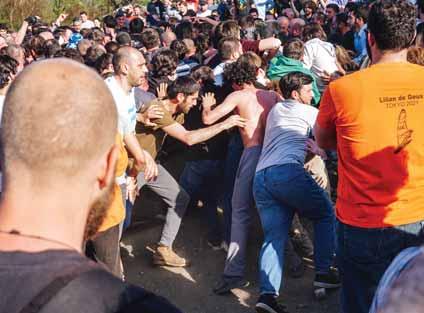
to play Lelo.
Residents of Shukhuti are divided into two groups - Zemo (Upper) and Kvemo (Lower) Shukhuti, who face off against each other.
THE BALL USED FOR PLAYING IS NOT THE BALL YOU KNOW
The Easter Sunday morning starts with the sewing of a black leather ball filled with sand, soil, and sawdust, symbolically soaked with a glass of red Aladasturi wine. The ball should weigh at least 1 pound (16 kg). It could be more, but no less. This year's ball weighed around 17.5 kg.
They write the word 'Lelo' and the current year on the ball with white paint. Every year, residents make a new ball before the game.
When done, the ball is brought inside the village’s St. George Church to be blessed and kept secure before the game starts. This is your chance to line up to hold and take a photo with the heavy ball.
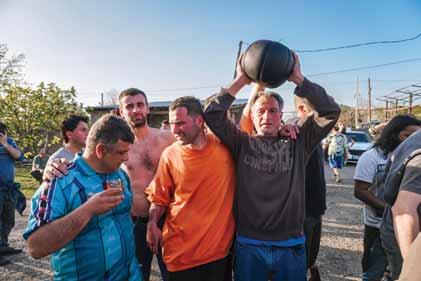
THE GAME, COMMONLY KNOWN AS 'RUGBY WITHOUT RULES', DOES HAVE SOME RULES
Although many think that Lelo Burti has no rules except to get the ball to the marked territory, the game does in fact have some “musts” and “mast nots”. Participants are not allowed to play under the influence of alcohol (though I doubt that is well observed during the game).
The number of players in Lelo Burti is flexible, but the more people participating from each side of the village, the bigger their chance of winning.
If you’re brave enough, anyone can participate in the game, be they Georgian or foreign, kids, and women, though the latter rarely do. It still is mainly a man's game. This year I saw a group of Polish men who had come just to participate in Lelo Burti.
The time is not capped - it continues until one team wins. It can be 30 minutes or three hours. This year it lasted around one hour.
The game starts at the center of the village, a few meters from the church, right after Father Saba brings out the ball.
A man standing beside Father Saba wearing a traditional Gurian shirt and Kabalakhi - a men's headscarf - fires a
PUBLISHER & GM
George Sharashidze
COMMERCIAL DEPARTMENT
Commercial Director: Iva Merabishvili
Marketing Manager: Natalia Chikvaidze
EDITORIAL DEPARTMENT:
Editor-In-Chief: Katie Ruth Davies
shotgun as the priest throws the ball to the participants.
Back in the day, the eldest resident of the village had the honor of starting the game, but for the last decade or so, Father Saba has done the honors.
The rule is to carry the ball over a distance of approximately 400 meters to one of two streams on opposite sides of the starting point. In the past, the distance was bigger, prolonging the game, which at times went on for the entire day.
The area between the streams, including courtyards, gates, and orchards, serves as the game zone. The highway is closed until the match is over. Patrol police are mobilized from early morning.
There are no rules on what a person can or cannot do to get the ball. Any maneuver or form of pushing is allowed. As such, injuries do happen, and when they do, participants raise their hands to signal for a pause to give time for the person to get out of the scrum.
This practice typically works well, but sometimes fatalities do occur, the last such case happening in 2015, when a middle-aged man tragically passed away during a game of Lelo Burti. They say the match went on without him.
The game ends once the ball is carried across the stream. And while the only tangible prize in Lelo is the ball itself, the pride and honor of winning can last for generations.
TEAMS SHOULD GET THE BALL TO THEIR OWN
SIDE OF THE VILLAGE
This is where many articles and blog posts about Lelo Burti make mistakes. In other similar games, a team wins by crossing the opposing team's goal lines. It is entirely the opposite in Lelo Burti.
To be considered a winning team, the participants must get the ball to their own side of the village. Therefore, the teams stand on opposite sides - Zemo Shukhuti on Kvemo Shukhuti's side, and vice versa.
When the shotgun is fired, and the ball is thrown, whoever gets the ball starts moving and pushing the scrum.
To visualize, if the ball is in the hands of the Zemo Shukuti team, for instance, they'll start pushing to move the crowd back toward their stream and goal line.
FROM THE VIEWERS' POINT OF VIEW, IT'S NOT YOUR TYPICAL BALL GAME
Lelo Burti brings hundreds of Shukhuti residents to play the game, and even more spectators from neighboring villages, towns, regions, and even foreigners who want to experience the ancient Georgian traditional ball game.
Unlike many similar sports games where you can clearly follow where the ball is, who has an advantage, and basically understand the game's rules, Lelo Burti is different in that sense too.
There is no throwing the ball or passing it through; instead, it's always kept low in someone's arms. The rest of the players push and tug. Therefore, it's almost impossible to see it during the match.
Many players don't even touch the ball; their primary role is to push against the giant scrum to move the mass toward the stream.
When players need fresh air, to have a break, or drink water, they come out of the scum, rest, and then head back in.
THE WINNING TEAM DOESN'T TAKE THE BALL HOME
Back in the day, players believed that the winning side would secure a better harvest that year. Today, the winners honor the dead.
After the match, the winners carry the ball to the cemetery and place it on the grave of a local resident who passed away the previous year. The ball will find its resting place there, forever.
Before the match, Zemo and Kvemo Shukhuti separately chooses the deceased in their own communities to
devote the ball to. Therefore, the residents already know on whose grave the ball will be placed depending on who wins the game.
This year, Zemo Shukhuti won the Lelo Burti, and the ball was placed on Aleksandre Mgeladze's grave, who died last year at the age of 47.

DON'T JUST LEAVE WHEN THE MATCH IS OVER
Before going to the cemetery, the winners and spectators parade to the deceased family member's house to honor the person.
The courtyard of said house is laid with a table, offering food and lots of wine. Everyone is welcome to make a toast, congratulate the winners, and pay respects to the dead.
After a few toasts and photos with the winning team, the crowd moves towards the cemetery.
The ball is placed in front of the gravestone, candles are lit, and everyone pays their respect with a minute or two of silence.
Then, there's a slightly bigger supra (feast) waiting for anyone who wants to join in celebrations and honor the deceased person. Father Saba also joins for a brief blessing, prayer and toast.
THERE ARE OTHER FESTIVE EVENTS TO ENJOY BEFORE THE GAME
Lelo Burti is a day-long festivity. The event starts in the morning with sewing the ball, followed by a small market selling local products from Lanchkhuti municipality, a few other sports games, and a concert by a Georgian band. The game kicks off at 5 pm.
Gurian ethnographic items from the local museum, such as a gramophone, coal iron, pans, and pots, were on display for visitors, along with a poster of Gurian horse riders known as “Russian Cossacks,” one of the main participants at Buffalo Bill's Wild West shows in the 1890s in the USA.
A few local folk choirs performed Gurian polyphonic songs in the background of wrestling matches.
Goderdzi Makharadze, a several-time Guinness World Records holder in heading a soccer ball, improved his record by heading the ball while walking up and down a ladder.
The fair also included a few local food specialties for everyone to try. One was a type of Khachapuri native to Lanchkhuti - Brinjula - made primarily with rice flour and baked on a stone pot ketsi.
Overall, a trip to see Lelo Burti is well worth your time, whether you plan to get in the scrum or not!
Journalists: Ana Dumbadze, Vazha Tavberidze, Tony Hanmer, Emil Avdaliani, Nugzar B. Ruhadze, Michael Godwin, Ketevan Skhirtladze, Mariam Mtivlishvili, Erekle Poladishvili
Photographer: Aleksei Serov
Website Manager/Editor: Katie Ruth Davies
Layout: Misha Mchedlishvili
Webmaster: Sergey Gevenov
Circulation Managers: David Kerdikashvili, David Djandjgava
ADDRESS 1 Melikishvili Str.
Tbilisi, 0179, Georgia
Tel.: +995 32 229 59 19
E: info@georgiatoday.ge
F: GeorgiaToday
ADVERTISING & SUBSCRIPTION
+995 555 00 14 46
E-mail: marketing@georgiatoday.ge
Reproducing material, photos and advertisements without prior editorial permission is strictly forbidden. The author is responsible for all material. Rights of authors are preserved. The newspaper is registered in Mtatsminda district court.
Reg. # 06/4-309
GEORGIA TODAY APRIL 21 - 27, 2023 11 SPORTS GEORGIA TODAY




 COMPILED BY ANA DUMBADZE
COMPILED BY ANA DUMBADZE



















 BY MARIAM MTIVLISHVILI
BY MARIAM MTIVLISHVILI


 BY KATIE RUTH DAVIES
BY KATIE RUTH DAVIES








